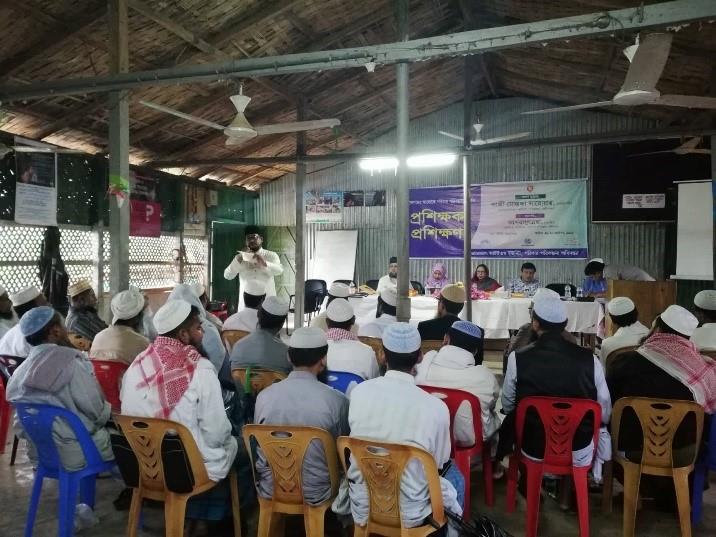No one plans to give birth in a refugee camp, but women’s reproductive health needs don’t stop in a crisis. Last year, experts estimated a staggering 34 million women of reproductive age were displaced due to humanitarian crises worldwide.
To date, close toone million Rohingyas have fled from violence in Myanmar to neighboring Bangladesh, often walking for days through jungles and other perils to reach the camps. According to UNFPA, over the past 20 years, an entire generation of babies have been born in the world’s largest refugee camp, Cox’s Bazar — and more than 4,000 of them were born in UNFPA-supported health facilities.
“The living conditions are terrible,” said Dr. Abu Sayed Mohammad Hasan, Program Specialist-SRH at UNFPA Bangladesh and FP2020 Focal Point. “Ten people will sleep in a tiny room, many of whom will need to share a bathroom, and too often people cook with an unsafe indoor cook-stove.”
A complex web of government, military, civil society, and international partners are working together to make life in the camps possible. There are primary and secondary schools, usually supported by UNICEF, health facilities, food distribution points, and more. According to UNFPA, specific attention is needed to RH to ensure women and girls can access the life-saving services they need. The organization is leading a working group that coordinates RH response efforts and implementation of the MISP, orMinimum Initial Service Package. The MISP is a set of priority reproductive health actions that should be implemented from the onset of every humanitarian crisis.
The health needs for these refugees, including reproductive health, are staggering — and often people are fleeing from rural areas that may not have had any accessible health facilities. That means refugee camps like Cox’s Bazar present a critical opportunity: for the first time, many women and girls can access healthcare they might not have been able to reach at home. It’s one of the many reasons why investing in family planning in a humanitarian crises is so critical: for so many women, it’s their first chance to have their needs met — to talk to a doctor and discuss their family planning needs. In a humanitarian crisis, incidences of gender-based violence also increase, so making sure women are able to access care quickly, including emergency contraception and care for survivors, with as few barriers as possible is critical.
Imams at a “train the trainers” workshop to sensitize religious leaders to family planning in an Islamic context
Because so many refugees come from areas without a health facility, one of the greatest barriers Dr. Hasan said he and his colleagues face is refugees’ general unfamiliarity with healthcare systems: “Antenatal care, delivery services, post-natal care, immunizations… it’s possible they aren’t familiar with any of it when they came to the camps,” he said. As a result, making reproductive healthcare as accessible as possible has been a critical goal of UNFPA’s team in Cox’s Bazar — sometimes showing women the facilities themselves.
“We have a three-wheeler to bring women in labor to a health facility,” said Antora Arefa Hossain, UNFPA’s Family Planning Officer based in Cox’s Bazar. People see the three-wheeler driving through the camps, and women have spread the word that it’s one way to make sure they’re able to access a safe delivery facility as well as postpartum family planning.
UNFPA has also created a short documentary to promote family planning and dispel myths around reproductive health in the camps (a project funded through the FP2020 Rapid Response Mechanism, or RRM). The film was developed in the Rakhine dialect, the language spoken by most refugees, and Bangladeshi, to make sure it could be understood by as large an audience as possible. Unfortunately, because it was shown during evenings, many women weren’t able to attend as they didn’t feel comfortable leaving their homes after nightfall.
The solution? Shanti khana, or “homes of peace.” UNFPA’s women-only spaces have been extremely successful, serving 150,000 women as of August 2018. The film is now scheduled to be shown in the centers on several afternoons, so women are able to see it in a space that is safe and accessible.

UNFPA has also worked to overcome religious myths and stigma around Long-Acting Reversible Contraceptives (LARCs), by working directly with religious leaders. As part of this work, UNFPA gathered 50 religious leaders from Ukhiya and Teknaf sub-districts — both in Cox’s Bazar — for an interactive workshop to learn more about family planning. After completing the workshop, Imams were committed to publicly discussing family planning during weekly religious meetings, and breaking the social stigma that falsely portrays Islam as anti-family planning, while also promoting information sharing so people living in the camps are aware of the services they can access.
“The government of Bangladesh has made it clear family planning is a nationwide priority — in Cox’s Bazar and beyond” said Dr. Asa Torkelsson, UNFPA Country Representative in Bangladesh. UNFPA along with other FP2020 partners are fully supporting the government’s efforts. Bangladesh first made an FP2020 commitment in 2012, and revitalized their commitment in 2017. The country doesn’t just talk the talk, either: spending an estimated $225,000,000 on family planning in 2016. Learn more about Bangladesh’s commitment, and about FP in humanitarian crises, on the FP2020 website.


